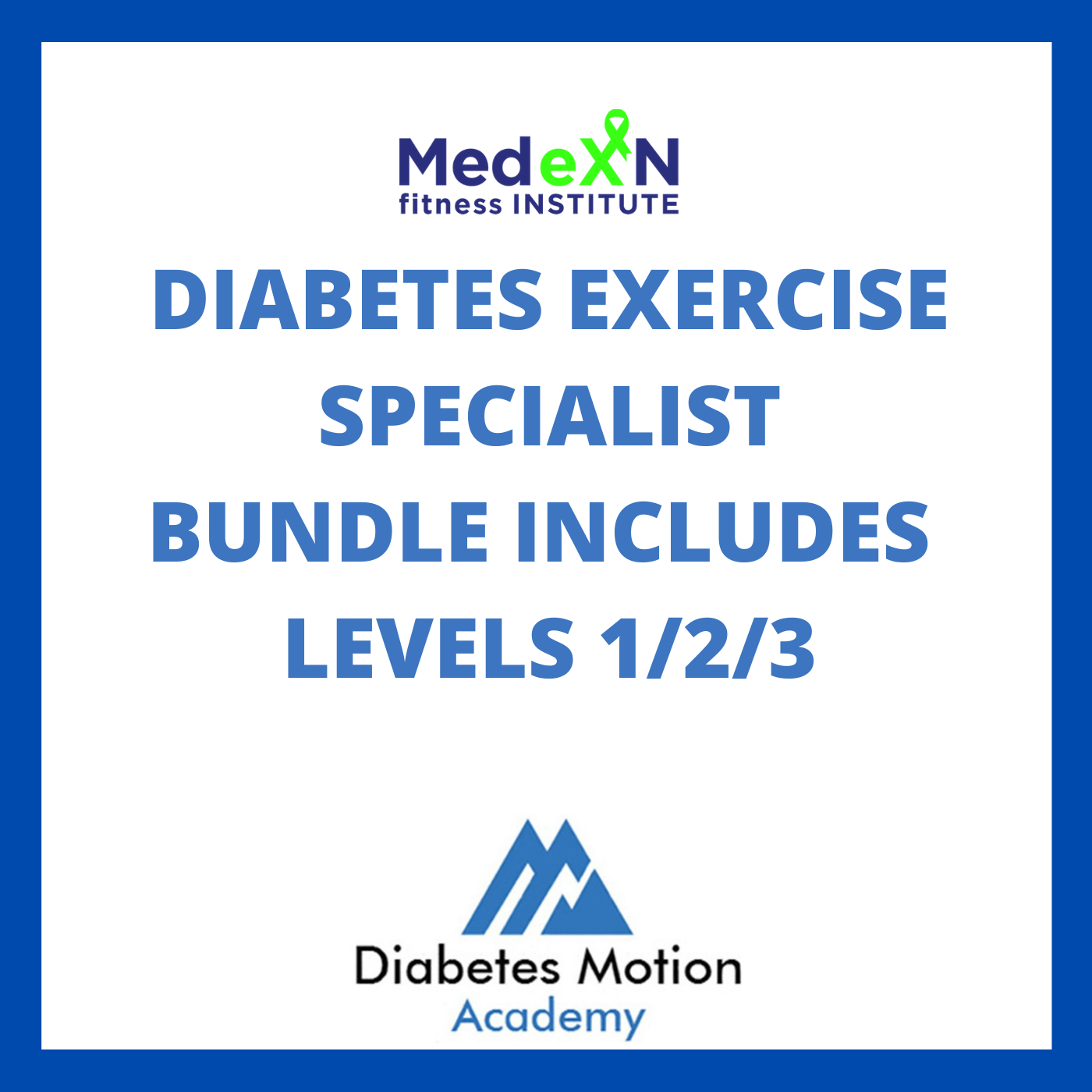Working with Clients with Diabetes or Prediabetes**** Diabetes Exercise Specialist Certificate (Bundle) Canadian Edition/Save 20% when you use code SAVE20 at the checkout!
$399.20
Save 20% when you use code SAVE20 at the checkout!
***NEW*** CECs for Canfitpro 4 PTS, FIS, HWL***
This Bundle contains the three courses you need to complete to become a Diabetes Exercise Specialist (DES)!
Level 1: Begin your journey….
Course Description:
Master the basics for working with clients who are physically active with diabetes or prediabetes, including types of training that are appropriate and critical, injury prevention, blood glucose monitoring, medication basics (and exercise effects), complications, exercise motivation, and more.
All certified personal trainers need this information to train these clients.
Level 2: Continue the Climb …..
*Successful Completion of Level 1 is required prior to taking Level 2
Course Description:
This intermediate course covers more on insulin resistance, interval and other key types of training, oral medications, food effects on activity, avoiding hypoglycemia, diabetes health complications, medication weight gain and loss, youth with diabetes, latest training trends, and overcoming specific and diabetes-related barriers to motion with effective goal-setting and technology use.
Level 3: Reach the Summit of Knowledge….
*Successful Completion of Level 1 and Level 2 is required prior to taking Level 3
Course Description:
This advanced course gives Certified Personal Trainers and other Fitness Professionals the Summit of Knowledge on working with clients with any type of diabetes or with prediabetes. It covers the final topics related to diabetes and prediabetes, including gestational diabetes and other concerns related to working with female clients. There is more information about the types of insulin people with type 1 diabetes use (and well as many with type 2 and gestational diabetes) and how to help dedicated athletes troubleshoot their performance issues. Finally, CPTs will learn more about the best technologies to use to train clients with diabetes and prediabetes.
On the successful completion of Level 3 (and the preceding Level 1 and Level 2 courses) the certification of Diabetes Exercise Specialist (DES) will be provided.
Nearly 33% of Canadians are living with Diabetes or Prediabetes!!!
All certified Personal Trainers and Group Instructors need this information to train these clients!
ENROLL NOW AND START YOUR CAREER AS A DIABETES EXERCISE SPECIALIST!!!



 Course Author: Sheri R. Colberg, PhD, FACSM, is an author, exercise physiologist, lecturer, and professor emerita of exercise science (Old Dominion University, Norfolk, VA). In 2016, she was honored with the American Diabetes Association Outstanding Educator in Diabetes Award. A respected researcher and lecturer, she has authored more than 400 articles on exercise, diabetes, and health, as well as numerous books, including Diabetes-Free Kids, The 7 Step Diabetes Fitness Plan, 50 Secrets of the Longest Living People with Diabetes, The Science of Staying Young, The Diabetes Breakthrough, Diabetes and Keeping Fit for Dummies., and The Athlete’s Guide to Diabetes. Her articles, blogs, videos, and more are available on her websites at www.shericolberg.com and www.diabetesmotion.com.
Course Author: Sheri R. Colberg, PhD, FACSM, is an author, exercise physiologist, lecturer, and professor emerita of exercise science (Old Dominion University, Norfolk, VA). In 2016, she was honored with the American Diabetes Association Outstanding Educator in Diabetes Award. A respected researcher and lecturer, she has authored more than 400 articles on exercise, diabetes, and health, as well as numerous books, including Diabetes-Free Kids, The 7 Step Diabetes Fitness Plan, 50 Secrets of the Longest Living People with Diabetes, The Science of Staying Young, The Diabetes Breakthrough, Diabetes and Keeping Fit for Dummies., and The Athlete’s Guide to Diabetes. Her articles, blogs, videos, and more are available on her websites at www.shericolberg.com and www.diabetesmotion.com.
Danielle Pointon –
There are three main criteria I look for when choosing a course that is aligned with my career focus:
1. Is the Content related to Industry trends – does it have upward trajectory? (market need)
2. Who has provided the content- ie. who is the certifying authority?
3 . Do the modes of learning include theory, hands on experience, and continuous long term learning?
MEDEXN and Dr. Sheri Colberg deliver all of this in an excellent format with relevant content. In addition they were very responsive to questions and a delight to correspond with.
DIABETES is a rapidly growing concern which can have devastating long term effects if you cannot get in front of it. This will give you the tools to make a difference in your own life and the life of others. Thank you and well wishes in your career paths.
Ps- make the extra investment in Dr. Colberg’s published books for additional resource- they are very detailed.
Heather Creamer –
Thank you Danielle for the review. We are so excited to have you join our Diabetes Exercise Specialist community, and now the medical community has another Powerful resource!